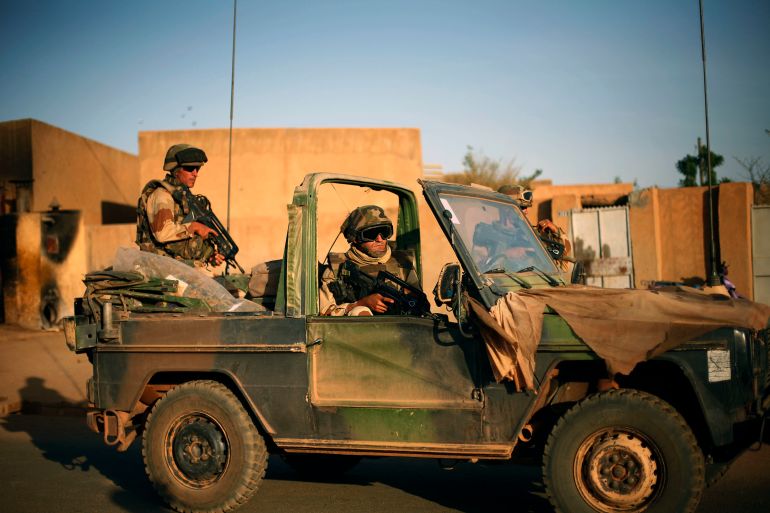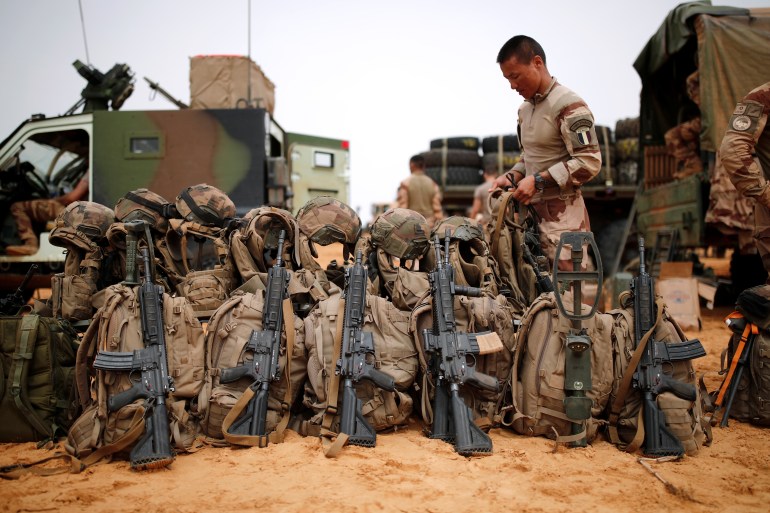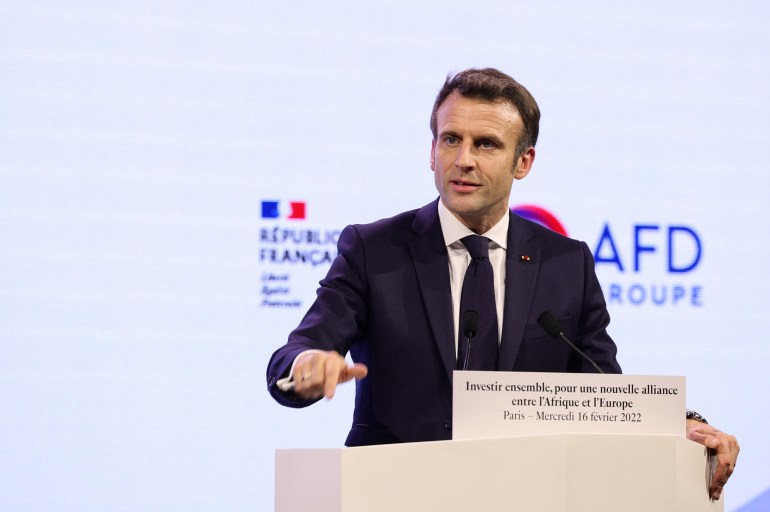France, European allies announce military withdrawal from Mali
French President Emmanuel Macron denies that the almost decade-long military deployment led by his country has ended in failure.

France and its allies in a European force have announced they will begin withdrawing troops from Mali after nearly 10 years fighting armed unrest.
A statement signed by France and its African and European allies and published on Thursday said that “multiple obstructions” by the ruling military government meant that the conditions were no longer in place to operate in Mali.
Keep reading
list of 3 itemsMali expels France envoy over ‘hostile and outrageous’ remarks
Tensions mount between Mali and France: How did we get here?
The decision applies to both France’s Barkhane force in the Sahel and the Takuba European force that Paris had been trying to forge along with its allies.
“The political, operational and legal conditions are no longer met to effectively continue their current military engagement in the fight against terrorism in Mali,” the statement said.
The allies, therefore “decided to commence the coordinated withdrawal of their respective military resources dedicated to these operations from Malian territory”.
On his part, French President Emmanuel Macron “completely” rejected the idea that France had failed its former colony, adding: “We cannot remain militarily engaged alongside de-facto authorities whose strategy and hidden aims we do not share.”
He said that France’s bases in Gossi, Menaka and Gao in Mali would be closed within the next four to six months.
The withdrawal would be carried out in an “orderly” manner, Macron promised.

Later on Thursday, Mali proposed that European states participating in the Takuba force continue cooperating bilaterally, an army statement said.
Foreign Minister Abdoulaye Diop and Defence Minister Colonel Sadio Camara raised the idea to European ambassadors in a meeting in Mali’s capital Bamako.
“All partners who wish to work with Mali in securing the country … are welcome,” Diop was quoted as saying.
Delina Goxho, a specialist in security in the Sahel region, told Al Jazeera from neighbouring Niger’s capital, Niamey, that the withdrawal would leave a security vacuum, creating a problem for both Mali and Niger.
“In the short term, what we foresee is the vacuum in terms of security especially in the border area where most armed groups are located,” she said.
“The fact that Barkhane will not be providing security at least for a while … it will be a problem for those troops both Malian and Niger in particular. So this will have immediate consequences.”
Olivier Salgado, the spokesman for UN’s MINUSMA peacekeeping mission in Mali, told the AFP news agency that the UN was studying the impact of the pullout and would “take the necessary steps to adapt”.
Fraught with problems
The Mali deployment has been fraught with problems for France. Of the 53 soldiers killed serving in its Barkhane mission in West Africa, 48 of them died in Mali.
France initially deployed troops against rebels in Mali in 2013 but the violence was never fully quelled, and now new fears have emerged of a rebel push to the Gulf of Guinea.
Even after the pullout from Mali, however, the allies promised to remain engaged in fighting “terrorism” in other countries including Niger.
“They agreed nonetheless to continue their joint action against terrorism in the Sahel region, including in Niger and in the Gulf of Guinea,” the statement said.
“They have begun political and military consultations with them with the aim to set out the terms for this shared action by June 2022.”
Upcoming elections
The announcement of the withdrawal came at a critical time for Macron, just days before a long-awaited declaration from the president that he will stand for a new term in April elections.
It also coincided with Macron seeking to take a lead role in international diplomacy as he presses Russia to de-escalate in the standoff over Ukraine.
Especially with the French elections looming, Macron’s priority is to ensure that any withdrawal does not invite comparisons with the chaotic US departure from Afghanistan last year.
Macron on Wednesday prepared the ground for the announcement with a dinner bringing together the leaders of France’s key allies in the Sahel region – Chad, Mauritania and Niger.
Officials from Mali and Burkina Faso, which also recently experienced a coup, were not invited to the meeting.

A total of 25,000 foreign troops are currently deployed in the Sahel region.
They include about 4,300 French soldiers, which under a reduction announced last year are due to fall to about 2,500 in 2023 from a peak of 5,400.
Other forces deployed in Mali are the UN peacekeeping mission MINUSMA established in 2013 and the EUTM Mali, an EU military training mission that aims to improve the Malian military’s capacity in fighting armed rebels.
French deployment
About 2,400 French soldiers are deployed in Mali as part of the Barkhane operation as well as the EU Takuba force set up in 2020, which was intended to increase in numbers as French deployment was scaled back.
According to a French source, who asked not to be identified by name, even after its departure, France will for a period provide MINUSMA and EUTM with air support and medical back-up.
But Paris’s withdrawal could set the stage for other European powers like Britain or Germany to abandon their roles in the multinational missions.
“The departure of Barkhane and Takuba creates a void,” Ivorian President Alassane Ouattara said on Wednesday.

In the Sahel and Gulf of Guinea, “national armies will have to deal with problems on our national territories, and that’s our philosophy”, he told broadcasters RFI and France 24.
Relations between France and Mali have plunged to new lows after the military government led by Assimi Goita refused to stick to a calendar to a return to civilian rule.
The West also accuses Mali of using the services of the hugely controversial Russian mercenary group Wagner to shore up its position, a move that gives Moscow a new foothold in the region.
“It is an inglorious end to an armed intervention that began in euphoria and which ends, nine years later, against a backdrop of crisis between Mali and France,” commented the Le Monde daily.